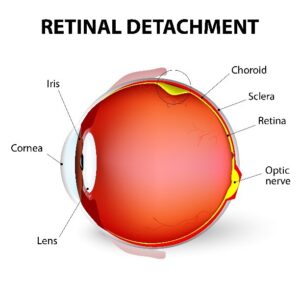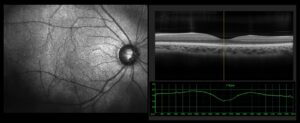What Is a Retinal Tear / Detachment?

Your retina plays a critical role in helping your brain interpret the images you see around you. Should this thin, light-sensitive tissue develop a tear, it can cause changes in your vision that range from mildly bothersome to debilitating.
Retinal tears often result from age-related changes to the eye’s vitreous. This clear, gel-like substance is loosely attached to the retina and moves with the eye without any issues. With advancing age, the consistency of the vitreous changes and parts of it can stick to the retina. If strands of vitreous pull or tug hard on the retina, it can create small breaks or tears (similar to a rip in a piece of cloth).
Many retinal tears develop into a more serious problem called retinal detachment, wherein the retina separates from the back wall of the eye. This happens if vitreous gets through the tear or break in the retina. When the retina is moved out of its normal position, it does not work properly. Retinal detachment is a very serious condition that, left untreated, can cause irreversible vision loss and blindness.
Expert care for retinal tears and retinal detachment is available at Berks Eye Physicians & Surgeons. Our retina specialist provides thorough, timely diagnosis and treatment for the best chances of a normal or near-to-normal visual recovery.
Retinal Tear Symptoms
Retinal tears can cause the sudden onset of “floaters,” which are spots or objects that appear to float around in your field of vision. If these floaters are accompanied by “flashes,” or the illusion of flickering or flashing lights in your visual field, it can indicate retinal detachment. Other symptoms include blurry vision, a gradual decline in peripheral (side) vision and what appears as a dark, shadow-like curtain passing over your vision.
Risk Factors Leading to Retinal Detachments
- Advanced age (i.e., over the age of 50)
- Extreme nearsightedness
- Family history of retinal tears or retinal detachment
- Previous retinal detachment
- Traumatic injury to the eye
Prevention
Most retinal tears and detachments cannot be prevented. If you are at a heightened risk of retinal problems, it is recommended you know the warning signs to look for and contact our team promptly if you notice any symptoms.
Diagnosing a Retinal Tear or Detachment

Retinal tear and retinal detachment are diagnosed with a comprehensive eye examination. Sometimes our retinal specialist uses optical coherence tomography (OCT) technology to scan the retina and look for any holes, tears or detachments.
Retinal Tear/ Detachment Treatment Options
Various techniques can be used to treat a retinal tear that has not progressed to a retinal detachment. Depending on the characteristics and severity of the problem, we may recommend laser therapy or cryopexy (i.e., freezing) to secure or weld the retina to the back wall of the eye.
Retinal detachments must be treated promptly to avoid permanent vision loss. Sometimes our retinal surgeon injects an air or gas bubble into the eye to press the retina against the back wall of the eye. In other cases, surgery may be required to remove the vitreous and other tissue pulling on the retina and repair the detachment; the vitreous is initially replaced with air, gas or liquid that is eventually replaced with natural eye fluids. Another option is a scleral buckle procedure, wherein the surgeon places a small band around the eyeball to indent the wall of the eye and close the tear or hole.
We will consult with you to determine the most appropriate option for your eyes and vision.
Learn More from Our Retinal Specialist
For more information about retinal tears and detachments, please reach out to Berks Eye Physicians & Surgeons today.
 1802 Paper Mill Road, Wyomissing, PA 19610
1802 Paper Mill Road, Wyomissing, PA 19610

